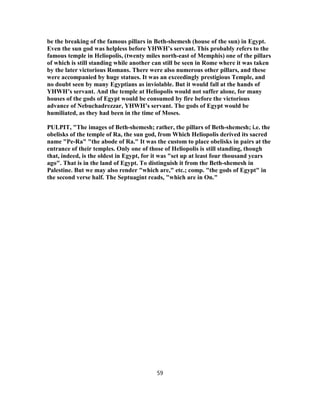Jeremiah 43 details the refusal of the leaders of Judah to obey God's command delivered by the prophet Jeremiah, instead choosing to flee to Egypt. They accused Jeremiah of lying and claimed he was influenced by Baruch, seeking their harm. Despite Jeremiah's clear prophecies and warnings, the people demonstrated obstinacy and pride, ultimately leading to their intended flight to Egypt.
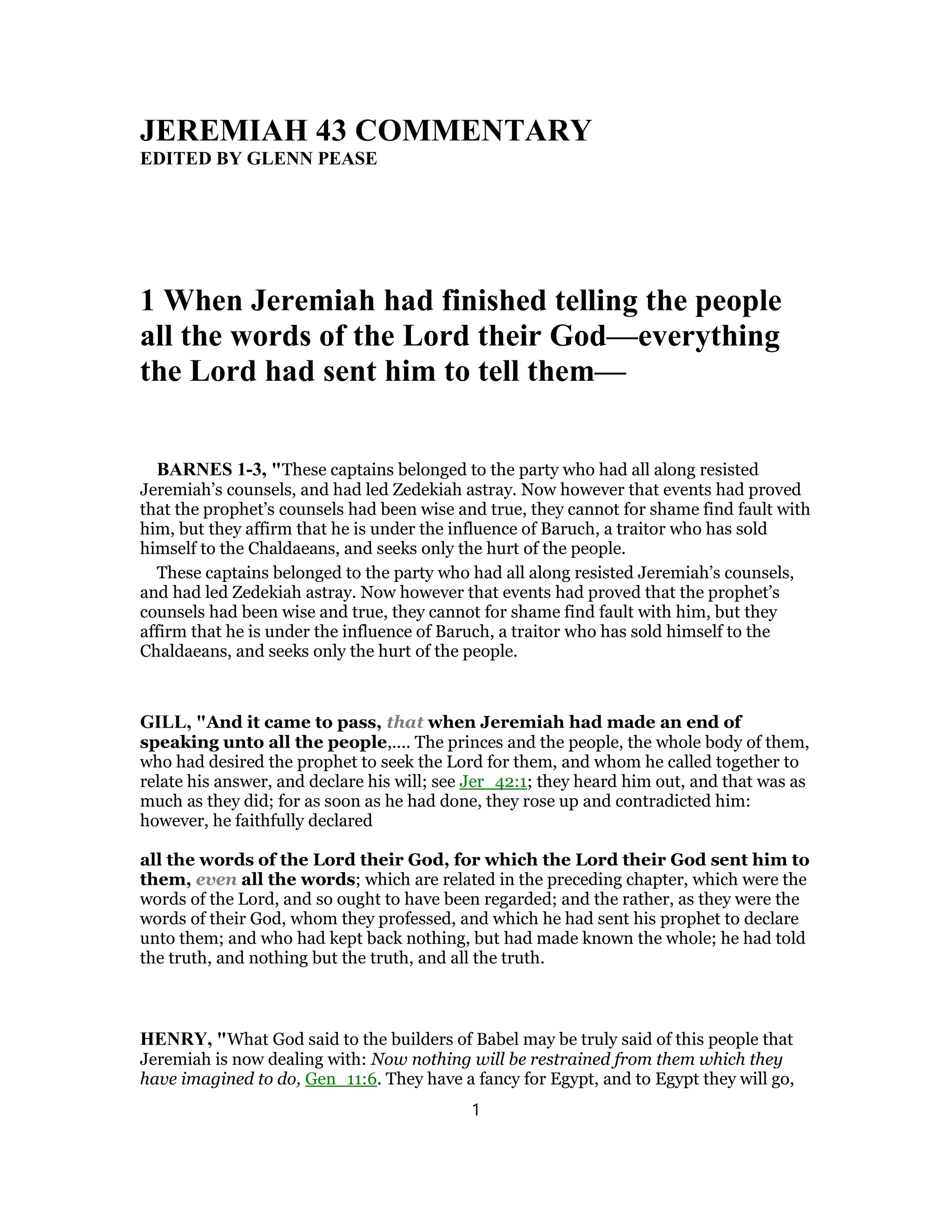
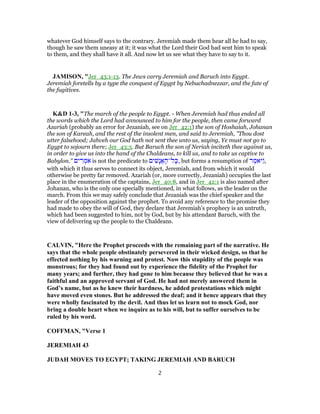
![This is a tragic chapter indeed. "Think of it! Abraham's descendants returned to
Egypt long after their liberation from it. With great suffering they had been
delivered from their bondage in Egypt, only to return nearly nine hundred years
later a defeated, hopeless remnant!"[1]
There is probably nowhere to be found a better comment upon the incredible
blindness of human politicians than the one afforded by this chapter.
The chapter divisions are: (1) Judah's leaders reject God's word (Jeremiah 43:1-4);
(2) Jeremiah and Baruch taken to Egypt (Jeremiah 43:5-7); (3) Prophecy of
conquest of Egypt (Jeremiah 43:8-11); and (4) Prophecy against the gods of Egypt
(Jeremiah 43:12-13).
Jeremiah 43:1-4
JUDAH'S LEADERS REJECT GOD'S WORD
"And it came to pass that when Jeremiah had made an end to speaking unto all the
people all the words of Jehovah their God, wherewith Jehovah their God had sent
him unto them, even all these words, then spake Azariah the son of Hoshaiah, and
Johanan the son of Kareah, and all the proud men, saying unto Jeremiah, Thou
speakest falsely: Jehovah our God hath not sent thee to say, Ye shall not go into
Egypt to sojourn there; but Baruch the son of Neriah setteth thee on against us, to
deliver us into the hands of the Chaldeans, that they may put us to death, and carry
us away captive to Babylon. So Johanan the son of Kareah, and all the captains of
the forces, and all the people, obeyed not the voice of Jehovah, to dwell in the land of
Judah."
"And all the proud men ..." (Jeremiah 43:2). The two prominent leaders, Azariah
and Johanan, were backed up by a group of men, called here "the proud men." The
versions provide further insight into the meaning of these words: "the insolent
men" (Revised Standard Version); "the arrogant men" (the Good News Bible).
They were the bold and confident unbelievers who constituted the vast majority of
that apostate generation of the Chosen People, having no regard whatever, either
for Almighty God, or God's prophets.
We do not believe that there was anything whatever in the allegations of those
Jewish leaders of either truth or probability. For example, their suggestion that
Baruch was the author of Jeremiah's prophecies here was an outright falsehood.
What a preposterous proposition it was that, "The prophet who would not trim his
message for the king himself would have allowed himself to be manipulated by his
secretary!"[2]
"All the people obeyed not ..." (Jeremiah 43:4) The insolent, loud-mouthed,
arrogant, and confident claims of the false leaders quickly swept away all objections
3](https://image.slidesharecdn.com/jeremiah43commentary-161128141856/85/Jeremiah-43-commentary-3-320.jpg)
![to their policies; and they proceeded at once to Egypt. Jeremiah did not defend
himself against the charge of prophesying a falsehood, but trusted in the future to
reveal who was true and who was false.
TRAPP, "Jeremiah 43:1 And it came to pass, [that] when Jeremiah had made an
end of speaking unto all the people all the words of the LORD their God, for which
the LORD their God had sent him to them, [even] all these words,
Ver. 1. And it came to pass, that when Jeremiah had made an end, &c.] See here
how wicked men, and hypocrites especially, grow worse and worse, deceiving and
being deceived. Balaam being resolved to curse, however, went not as at other times
but set his face toward the wilderness. [Numbers 24:1-2] Now he would build no
more altars, but curse whatever came of it; so would these refractories, without
God’s good leave, go down to Egypt, putting it to the venture. Jeremiah’s sweet
words were even lost upon them.
PETT, "Verses 1-7
The People Of Judah And Their Leaders Reject The Word Of YHWH And Seek
Refuge In Egypt (Jeremiah 43:1-7).
Even as Jeremiah had been giving to the people ‘the word of YHWH’ he had
recognised from their reaction that they were going to reject it. And so it proved. A
group of ‘proud men’, which included the leaders of the people, came to Jeremiah
and accused him of prophesying at the behest of Baruch, the son of Neriah, who had
been Jeremiah’s amanuensis and was a man of high standing. And they then
subsequently sought refuge in Egypt, in the border town of Tahpanes. This had
clearly always been their intention, whatever word from YHWH Jeremiah brought
them. So once again Judah proved itself unwilling to obey the voice of YHWH.
We must not underestimate the significance of this event. YHWH had made a clear
offer to Judah to re-establish it in accordance with His promises in Jeremiah 31:28,
by ‘building it and planting it’. This was thus an open and direct rejection of the
new covenant. It will be noted that they did not attack Jeremiah directly. They did
so through Baruch, suggesting that Jeremiah’s influence over many of the people
was still large. By this means they justified to themselves their disobedience to the
word of YHWH. How easily we can find ourselves doing the same thing. We do not
directly refuse to obey God. Instead we find some way of arguing our way round
what He demands in order to justify our own position.
Jeremiah 43:1
‘And it came about that, when Jeremiah had made an end of speaking to all the
people all the words of YHWH their God, with which YHWH their God had sent
him to them, even all these words,’
4](https://image.slidesharecdn.com/jeremiah43commentary-161128141856/85/Jeremiah-43-commentary-4-320.jpg)
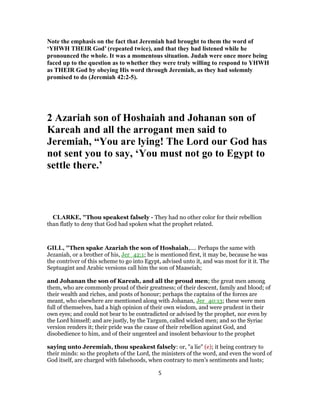
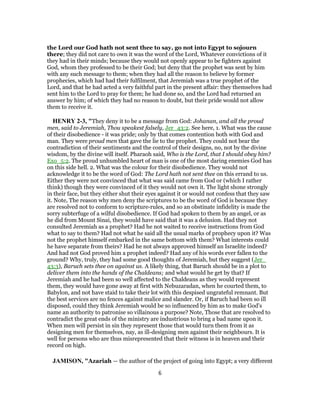
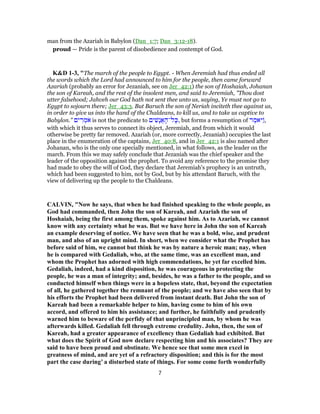
![courageous; but when things do not fall in with their wishes, they become ferocious
and rebel against God and men, and besides, they will never bear to be brought
under submission. Such, then, was John the son of Kareah: at one time he
manifested extraordinary virtue, but at length it appeared what he really was.
The Prophet, with the authority of a judge, declares that he and his associates were
proud: then Azariah the son of Hoshaiah, and John the son of Kareah, and all the
proud men, said, A falsehood dost thou speak. This was extremely insolent and
reproachful; for they had lately testified that they regarded Jeremiah as God’s
faithful servant, and that they would receive whatever he might bring as God’s true
oracle; but now they charge him with falsehood! how great was this presumption!
But it hence appears how deep and various, and how tortuous are the recesses which
are in the hearts of men; for at one time they announce honied words, and
afterwards they utter nothing’ but virulence. So from the same mouth, as it were,
almost in the same moment, comes forth what is sweet; and what is bitter.
Let us hence learn that the heart of man is full of every kind of deceit, until it be
cleansed by the Spirit of God. We also see, when once impiety boils up, to what
extremes it will proceed; for these men were not only insolent and reproachful
towards Jeremiah, but also towards God himself. And they did not now make
evasions as before, nor did they raise objections; but they openly raved against the
Prophet. Thus hypocrisy has indeed for a time its coverings, but when the ungodly
are urged by God, then they observe no bounds: Thou speakest what is false
COKE, "Jeremiah 43:2. Azariah—and all the proud men— That is, all those who
refused to obey the commands of the Almighty. The Hebrew word זדים zeidiim,
signifies pride, insolence, temerity, self-conceit. The greater part of those who
composed the company led on by Johanan, answered this character.
TRAPP, "Jeremiah 43:2 Then spake Azariah the son of Hoshaiah, and Johanan the
son of Kareah, and all the proud men, saying unto Jeremiah, Thou speakest falsely:
the LORD our God hath not sent thee to say, Go not into Egypt to sojourn there:
Ver. 2. Then spake Azariah.] See on Jeremiah 42:1.
And all the proud men.] Pride is the root of rebellion. See Jeremiah 13:15. These
men’s pride budded, {as Ezekiel 7:10} and as the leprosy, brake forth in their
foreheads. See Hosea 7:1. {See Trapp on "Hosea 7:1"}
Saying unto Jeremiah, Thou speakest falsely.] By this foul aspersion, not proven at
all, they seek to discredit his prophecy, like as the Jews do to this day the New
Testament, and the Papists the Book of Martyrs and other monuments of the
Church, saying of them, So many lines, so many lies.
PETT, "Jeremiah 43:2-3
8](https://image.slidesharecdn.com/jeremiah43commentary-161128141856/85/Jeremiah-43-commentary-8-320.jpg)
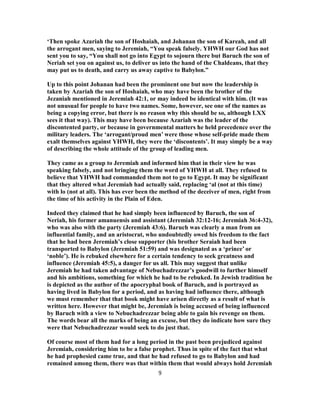
![in suspicion of being a Babylonian collaborator
3 But Baruch son of Neriah is inciting you against
us to hand us over to the Babylonians,[a] so they
may kill us or carry us into exile to Babylon.”
GILL, "But Baruch the son of Neriah setteth thee on against us,.... First they
charge the prophet with a lie, and deny his mission from the Lord; and now to lessen the
prophet's crime they charged him with, they lay the blame on Baruch, as if he, out of ill
will to them, had instigated the prophet to deliver such a message; which is not at all
likely, that he should be prevailed upon by a younger person, and his secretary, to take
such a step: nor can it be thought that Baruch should have any interest to serve by it;
and, besides, both he and the prophet were too good men, the one to instigate, and the
other to be instigated, to declare a falsehood in the name of the Lord. The end proposed,
they suggest, was
for to deliver us into the hand of the Chaldeans, that they might put us to
death, and carry us away captives into Babylon; either that he or the prophet
might deliver them into the hands of the Chaldeans, to be put to death by them, or be
carried captive; which is not at all probable, it being inconsistent with that piety and
humanity which were conspicuous in them both, and with their conduct, who chose
rather to abide in their own land, with this small and despicable handful of people, than
to go and live in the court of Babylon, where good care would have been taken of them.
JAMISON, "Baruch — He being the younger spake out the revelations which he
received from Jeremiah more vehemently. From this cause, and from their knowing that
he was in favor with the Chaldeans, arose their suspicion of him. Their perverse
fickleness was astonishing. In the forty-second chapter they acknowledged the
trustworthiness of Jeremiah, of which they had for so long so many proofs; yet here they
accuse him of a lie. The mind of the unregenerate man is full of deceits.
CALVIN, "They afterwards throw the blame on Baruch, who had been the
Prophet’s faithful servant. As they could not find out any reason why Jeremiah
should speak falsely, they turned their fury against Baruch. They did not then spare
Jeremiah for honor’s sake, but as they had no reason whatever to speak evil of him,
they fixed the blame on Baruch, who yet was as innocent as Jeremiah. Baruch, they
said, excites thee against us Had Jeremiah so prophesied through the influence of
10](https://image.slidesharecdn.com/jeremiah43commentary-161128141856/85/Jeremiah-43-commentary-10-320.jpg)
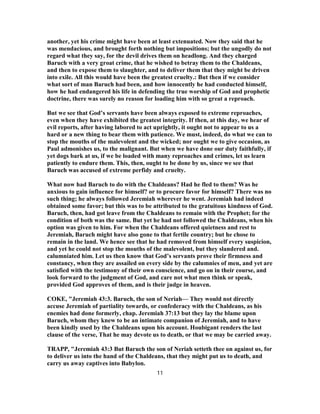
![Ver. 3. But Baruch, the son of Neriah, setteth thee on against us.] A likely matter.
What should Baruch gain by that? but malice careth not how truly or rationally it
speaketh or acteth, so it may gall or kill Jeremiah and Baruch must be said to be in
league together, and to collude for a common disturbance, like as the Papists say
Luther and Zuinglius did; whereas they knew nothing one of another for a long time
after that they began to stickle against Popery in several climates; and when they
did hear of one another, they differed exceedingly, in the doctrine of the sacrament
especially.
PULPIT, "Baruch the son of Neriah setteth thee on. A singular supposition—
Jeremiah leaving the initiative to his secretary! It may be conjectured that Baruch
had somehow made himself specially unpopular; he may have been a more practical
man (comp. Jeremiah 45:5) than Jeremiah.
4 So Johanan son of Kareah and all the army
officers and all the people disobeyed the Lord’s
command to stay in the land of Judah.
BARNES, "All the people - Many, nevertheless, would be unwilling agents,
compelled to do what their unscrupulous leaders forced upon the community.
GILL, "So Johanan the son of Kareah, and all the captains of the forces, and
all the people,.... The generality of them, at least, all agreed together, were of the same
mind, and in the same sentiment and practice: and so
obeyed not the voice of the Lord, to dwell in the land of Judah; it was the
command of the Lord they should dwell there, and not go into Egypt; but they would not
believe this was the voice of the Lord, only a scheme concerted between the prophet and
Baruch; or which the former was instigated to deliver as the word of the Lord by the
latter, and therefore would not give heed unto it; though the truth of the matter was, it
was contrary to their inclination and resolution, and therefore, though they had reason
to believe it was the will of God they should abide in their own land, yet they were
determined they would not, but go into Egypt, as they, did.
HENRY 4-7, "They determine to go to Egypt notwithstanding. They resolve not to
12](https://image.slidesharecdn.com/jeremiah43commentary-161128141856/85/Jeremiah-43-commentary-12-320.jpg)
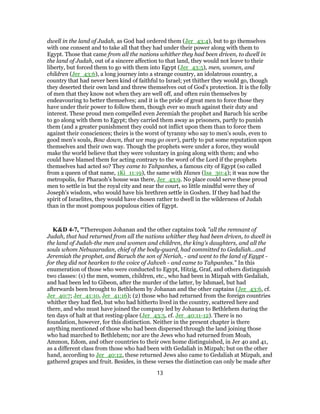
![the insertion into the text of the conjunction ְו before ים ִר ָבְגּ ַת־ה ֶ.א To "all the remnant of
Judah who had returned from the nations" belong the men, women, children, etc.,
whom Nebuzaradan had committed to the care of Gedaliah. The enumeration in Jer_
43:6 gives only one specification of the "whole remnant of Judah," as in Jer_41:16. "And
all the souls;" as if it were said, "and whoever else was still left alive;" cf. Jos_10:28.
Tahpanhes was a frontier town of Egypt on the Pelusian branch of the Nile, and named
Δάφναι by the Greeks; see on Jer_2:16. Here, on the borders of Egypt, a halt was made,
for the purpose of coming to further resolutions regarding their residence in that
country. Here, too, Jeremiah received a revelation from God regarding the fate now
impending on Egypt.
CALVIN, "The Prophet had sufficiently shewn that John the son of Kareah and the
rest had not in good faith inquired of the Prophet what the will of God was; for
when they saw that God’s counsel did not harmonize with their wicked and foolish
desire, they rose up against the Prophet. But he now more clearly condemns their
obstinacy in not obeying God; and it is said emphatically, that they did not obey the
voice of God, because they denied that God had spoken. Though then they sought to
evade, Jeremiah on the other hand declares, that he was a true interpreter of God’s
will, that he had announced nothing but what had come from God. He then brings
them all in as guilty, the leaders and the whole people, that no man might think it
strange that innocent men, willing to submit to God, were driven into Egypt. Hence
the Prophet shews here that they were all implicated in the same sin, since the
leaders alone did not resist the oracle, but also the whole people. It now follows,
TRAPP, "Jeremiah 43:4 So Johanan the son of Kareah, and all the captains of the
forces, and all the people, obeyed not the voice of the LORD, to dwell in the land of
Judah.
Ver. 4. So Johanan the son of Kareah, &c.] Nothing is more audacious and
desperate than a hypocrite when once discovered. Now these subdoli show
themselves in their colours, appear in their likeness, going on end with their work.
PETT, "Jeremiah 43:4
‘So Johanan the son of Kareah, and all the captains of the forces, and all the people,
did not obey the voice of YHWH, to dwell in the land of Judah.’
The consequence was that the commanders of the Judean forces, headed by
Johanan, together with ‘all the people’ (i.e. those present in the party) did not obey
YHWH’s voice. They refused to continue living in the land of Judah with the
constant threat of Nebuchadrezzar’s vengeance hanging over them. There is a
reminder here for all of us that before changing our whereabouts we should
consider the will of God.
14](https://image.slidesharecdn.com/jeremiah43commentary-161128141856/85/Jeremiah-43-commentary-14-320.jpg)
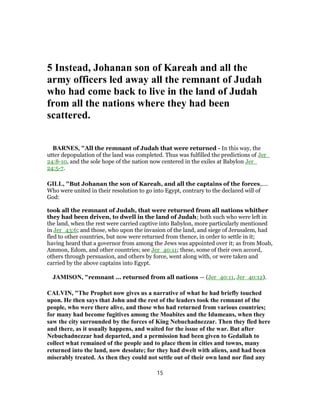
![quiet habitation, they returned, as it is usual with men reduced to want, who have
no settled dwelling. They then returned, that they might live under the protection of
Gedaliah.
Now the Prophet says, that they were taken by John and brought into.Egypt. This
then was the way in which they shewed their obstinacy. We hence see how
audacious must these leaders have been, that they hesitated not to go into Egypt,
though it was shewn to be a fatal step. There was not indeed at that time any army
of Nebuchadnezzar in Judea, though his vengeance might have been dreaded. And
then, having fled to: Egypt, they might have been ill-treated there, and not
hospitably received.: But we hence perceive, that when men once shake off the yoke
of God, they are hurried on by a diabolical madness, so that there is nothing
insurmountable to them. Had they been asked whether they acted rightly, they
might have raised a thousand arguments as excuses; but when they followed their
own propensity, they in a manner, so to speak, leaped over the clouds. Impiety then
is always full of rashness and audacity. But as we see that the ungodly thus rush
headlong into ruin, even when God pronounces a curse on their counsels and
proceedings, let us learn to take encouragement ever to obey God; for he promises a
joyful and blessed issue at all times when we follow the ways pointed out by him.
John then and the other leaders of the forces took the remnant of the people
And then he shews how little those exiles consulted their own good, who had
returned to dwell in the land of Judea; for they might have still rested in safety
among the nations who had in kindness received them; but in Egypt God soon
executed his judgments on the natives as well as on strangers. But they deserved
such a reward, because they preferred to obey the command of the perverse and
obstinate, rather than to obey the voice of God speaking by his Prophet.
COFFMAN, "THE RETURN OF JUDAH TO EGYPT
"But Johanan the son of Kareah, and all the captains of the forces, took all the
remnant of Judah, that were returned from all the nations whither they had been
driven, to sojourn in the land of Judah; the men, and the women, and the children,
and the king's daughters, and every person that Nebuzaradan the captain of the
guard had left with Gedaliah the son of Ahikam, the son of Shaphan; and Jeremiah
the prophet, and Baruch the son of Neriah. And they came into the land of Egypt;
for they obeyed not the voice of Jehovah: and they came unto Tahpanhes."
"Johanan... took all the remnant ... and Jeremiah... and Baruch... and came into the
land of Egypt ..." (Jeremiah 43:5-7). From this, it is certain that both Jeremiah and
his amanuensis Baruch were unwilling participants in this migration back to Egypt.
Tragic as this pitiful maneuver actually was, "It resulted in the fulfillment of
Jeremiah's prophecy that Jerusalem would be uninhabited (Jeremiah 24:8-10). This
migration to Egypt accomplished the utter de-population of the land; and the sole
hope of the nation was then (and afterward) centered in the Babylonian exiles."[3]
16](https://image.slidesharecdn.com/jeremiah43commentary-161128141856/85/Jeremiah-43-commentary-16-320.jpg)
![In the light of the unbelieving arrogance and conceit of that whole generation of
apostates, there was nothing whatever that God could have done with them, unless it
had been preceded by the sincere repentance and reformation of the people, that
being, according to all indications, an utterly impossible thing to have anticipated.
"Tahpanhes ..." (Jeremiah 43:7). This was an important fortified city on the eastern
Delta of the Nile, where Pharaoh had a summer home and some kind of an
administrative center. It seems to be the same place which Herodotus called
Daphnai, now thought to be the modern Tell-Defenneh, some 27 miles south-
southwest of Port Said.[4]
The immigrants probably stopped here in order to procure permission of Pharaoh
to enter Egypt, and to explore possible ways of making a living.
TRAPP, "Jeremiah 43:5 But Johanan the son of Kareah, and all the captains of the
forces, took all the remnant of Judah, that were returned from all nations, whither
they had been driven, to dwell in the land of Judah;
Ver. 5. But Johanan … took all the remnant of Judah.] Whose preservation had
been but a reservation to further mischief, a just punishment of their
incorrigibleness.
PETT, "Jeremiah 43:5-6
‘But Johanan the son of Kareah, and all the captains of the forces, took all the
remnant of Judah, who were returned from all the nations where they had been
driven, to sojourn in the land of Judah, the men, and the women, and the children,
and the king’s daughters, and every person that Nebuzaradan the captain of the
guard had left with Gedaliah the son of Ahikam, the son of Shaphan; and Jeremiah
the prophet, and Baruch the son of Neriah,’
Thus the whole group, ‘the remnant of Judah’, decamped and set off for Egypt. It is
difficult to know how far the description of those who went with them takes in all
the inhabitants of Judah. The description certainly covers the men who were in the
various fighting groups who had been guerillas, no doubt along with their families,
(they would see themselves as liable to retribution), together with former refugees
who had returned to Judah and could be seen as there ‘without permission’
(Jeremiah 40:11). And it includes all who had been living in Mizpah under the
protection of Gedaliah, who could be seen as liable to suspicion, especially daughters
of the royal house who could be made an example of. And it includes Jeremiah and
Baruch who were probably forced to go with them (even though they may have been
quite willing to go so as to cater to the spiritual needs of the people) . But there
would be many elsewhere in Judah who had survived the invasion, and among them
would be many of ‘the poor of the land’ to whom Nebuzaradan had given land who
were no doubt scattered throughout Judah (Jeremiah 39:10). None of them had
much to fear from Nebuchadrezzar’s reprisals. Thus the land may well have
17](https://image.slidesharecdn.com/jeremiah43commentary-161128141856/85/Jeremiah-43-commentary-17-320.jpg)
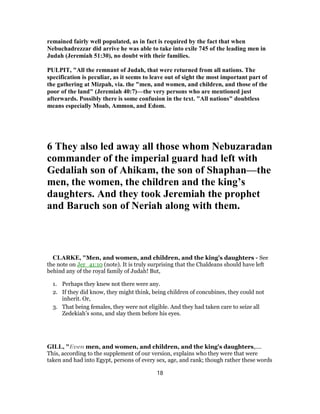
![design and describe persons distinct from the former, that came out of other countries;
see Jer_41:10;
and every person that Nebuzaradan the captain of the guard had left with
Gedaliah the son of Ahikam the son of Shaphan: even the poor of the land to till
it; and to whom he gave fields and vineyards, and committed them to the care and
government of Gedaliah, when the rest were carried captive to Babylon; and now these,
in some sort, may be said to be carried captive by their own brethren into Egypt:
and Jeremiah the prophet, and Baruch the son of Neriah; whom they forced
with them, partly to punish them, and partly to give countenance to their conduct; but
not without the will of God, who so ordered it in his providence, that they might have the
prophet with then, to reprove them for their sins, and warn them of their danger and
ruin, and so leave them inexcusable.
CALVIN, "The Prophet also mentions particularly who they were; they were men
and women and children Some render the last word “puberty,” which I do not
approve, since Scripture speaks thus of children. Then John and his associates took
childhood, or children; and he adds, the daughters of the king We have before
inquired who these daughters of the king were: the probability is that they were his
daughters by his concubines; and that they had been put in some safe place, so that
if any great evil happened, they might not fall into the hands of enemies. Then these
daughters of the king had returned with the other exiles, but were afterwards
carried into Egypt.
TRAPP, "Jeremiah 43:6 [Even] men, and women, and children, and the king’s
daughters, and every person that Nebuzaradan the captain of the guard had left
with Gedaliah the son of Ahikam the son of Shaphan, and Jeremiah the prophet,
and Baruch the son of Neriah.
Ver. 6. And Jeremiah the prophet, and Baruch the son of Neriah.] This was not
without a special providence of God, that these desperadoes might still have a
prophet with them, for the making of them the more inexcusable. If it befall any of
God’s faithful servants to be hurried whither they would not, as it did Jeremiah and
Baruch here, Paul also and Peter, [John 21:18] Ignatius, Polycarp, and other
prisoners and sufferers for the truth in all ages, let them comfort themselves with
these examples.
7 So they entered Egypt in disobedience to the
Lord and went as far as Tahpanhes.
19](https://image.slidesharecdn.com/jeremiah43commentary-161128141856/85/Jeremiah-43-commentary-19-320.jpg)
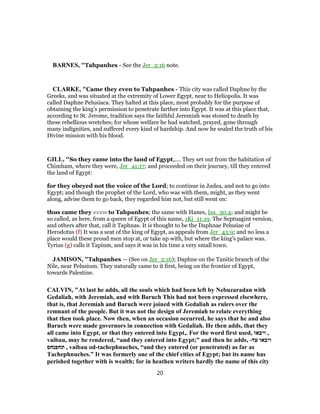
![is found. They indeed mention the city Taphnim, but speak not of Taphnees. It is
then probable, as changes take place in a country, that this city became by degrees
forsaken, so as to become obscure and mean, and that other cities were built which
exceeded it in wealth. He then says that they came to Taphnees It now follows, —
But this prophecy was greatly disliked; for as the Jews had been already much
exasperated, this threatening was still more calculated to kindle up their fury; and
Jeremiah did also create danger to himself from the Egyptians, for he not only
threatened the Jews, but also the whole kingdom of Egypt. We hence perceive how
invincible was his courage, for he marched through certain deaths, and was yet
terrified by no dangers, but performed the office entrusted to him by God. Some
think that he was on this account stoned by the Jews; but this is not probable, nay, it
may be gathered from other places that he died a natural death. However this may
have been, his perseverance and firmness were wonderful, for he struggled to the
end, and without weariness, with those wild beasts, whose savageness he had more
than enough experienced.
Let us now see what this prophecy is: The word of Jehovah came to Jeremiah; and
the sum of it is, that the Prophet was bidden not only to proclaim the vengeance of
God, but also to confirm it by a visible symbol, as it was necessary to arouse
unbelieving men. For so great was their stupidity, that unless God roused all their
senses, they would have never attended; they were deaf. Then the Lord set before
their eyes what they were unwilling and refused to hear. For this reason the Prophet
was bidden to add an outward sign to his prophecy; according to what we have
stated in other places, signs were often connected with the doctrine on account of the
tardiness, or rather the stupidity of men.
COKE, "Jeremiah 43:7. Thus came they even to Tahpanhes— That is to say, to
Daphne. This was one of the principal cities of Egypt; and in it was a palace where
their kings often resided. It is supposed by many to be the same city which was
afterwards called Daphne Pelusiaca. See Isaiah 30:4. St. Jerome tells us from an
ancient tradition, that the prophet Jeremiah was stoned to death in this place by the
Jews. See Lowth, and Calmet.
TRAPP, "Jeremiah 43:7 So they came into the land of Egypt: for they obeyed not
the voice of the LORD: thus came they [even] to Tahpanhes.
Ver. 7. Thus came they even to Tahpanhes.] A chief city of Egypt, called also Hanes.
[Isaiah 30:4] Jerome calleth it Tunis, and Herodotus, Daphnis Pelusiae.
PETT, "Jeremiah 43:7
‘And they came into the land of Egypt, for they did not obey the voice of YHWH,
and they came to Tahpanhes.’
So the refugees made for Egypt, and it is emphasised that this was because ‘they did
21](https://image.slidesharecdn.com/jeremiah43commentary-161128141856/85/Jeremiah-43-commentary-21-320.jpg)
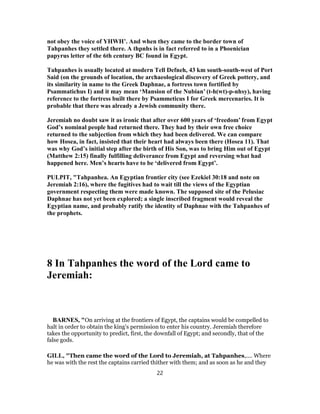
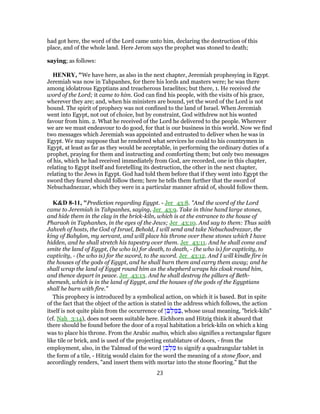
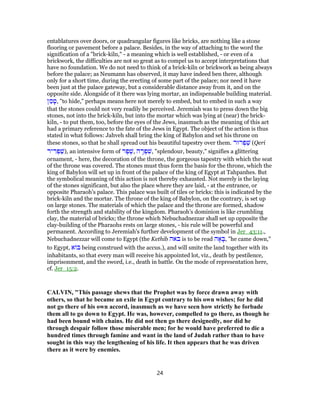
![But as nothing happens except through God’s purpose, so from this prophecy it
appears that God ordered the going down of his servant, and that he was not so
subjected to the will of the wicked, but that he was always guided by the hidden
influence of God; for it was God’s will to have his herald even in the midst of Egypt,
that he might declare to the Jews what, was to be. His doctrine, indeed, was not of
any benefit to them; but it was God’s purpose to drive them as it were into madness,
inasmuch as their wickedness was wholly irreclaimable; for it is a harder thing for
the wicked to hear God’s voice when he threatens vengeance, than to feel his hand.
When, therefore, the unbelieving avoid the word of God, they are still constrained,
willing or unwilling, to hear what they willfully reject, even that God will be their
judge. The Prophet then was sent, according to the hidden purpose of God, into
Egypt, that he might there perform his wonted vocation and proceed in the
discharge of his office, and there carry on his prophetic work.
COFFMAN, "JEREMIAH PROPHESIES THE CONQUEST OF EGYPT
"Then came the word of Jehovah unto Jeremiah in Tahpanhes, saying, Take great
stones in thy hand, and hide them in mortar in the brickwork, which is at the entry
of Pharaoh's house in Tahpanhes, in the sight of the sons of Judah; and say unto
them, Thus saith Jehovah of hosts, the God of Israel: Behold, I will send and take
Nebuchadnezzar the king of Babylon, my servant, and will set his throne upon these
stones that I have hid; and he shall spread his royal pavilion over them. And he
shall come and smite the land of Egypt; such as are for death, shall be given to
death, such as are for captivity to captivity, and such as for the sword to the sword."
We reject such irresponsible comment on this paragraph as that of Thompson who
stated that, "Jeremiah's prophecy was not fulfilled literally."[5] On the contrary,
both the Babylonian historian Berossus "confirms the conquest of Egypt by
Nebuchadnezzar";[6] and the Jewish historian Josephus flatly declared that,
"Nebuchadnezzar fell upon Egypt to subdue it; and he slew the king that then
reigned and set up another. He also took those Jews that were there captives, and
led them away to Babylon."[7] In the light of both Babylonian and Jewish historians
agreeing that such a conquest did indeed occur, we consider the historical evidence
heavily weighted in favor of the exact and circumstantial fulfillment of Jeremiah's
prophecy here. Yes, we are aware that there is a fad among current scholars who
accept only the writings of Josephus which they think can be used to support their
critical theories, rejecting all others; but we have no confidence in such rejections of
the only known historian of that era among the Jews.
Herodotus contradicted some of the things that Josephus wrote; but the reverse is
also true. Josephus contradicted some of the things Herodotus wrote. The ability to
decide who was correct in a given matter is simply not to be found in any man living
thousands of years after the events.
There is also some fragmentary archaeological evidence that Nebuchadnezzar
indeed invaded Egypt. "Three of Nebuchadnezzar's inscriptions have been found
25](https://image.slidesharecdn.com/jeremiah43commentary-161128141856/85/Jeremiah-43-commentary-25-320.jpg)
![near Tahpanhes."[8] "An ancient inscription confirms the fact that
Nebuchadnezzar invaded Egypt in 568 B.C, when Amasis was Pharaoh."[9]
It should always be remembered in the case of deciding whether or not prophecies
were fulfilled by historical events, that the fragmentary information which has
drifted down through history concerning those ancient times is totally inadequate to
justify the extravagant assertions of some critics denying that certain prophecies
were fulfilled. As Green noted, "The paucity of knowledge concerning the period is
such that it is impossible to know what happened."[10] In addition to that
impediment, there is in this very chapter the question of exactly what is meant by
the sacred text. For example, the word translated "obelisks" in Jeremiah 43:12,
"pillars" in some translations, etc., actually means "images" and is so used in
Isaiah.
Regarding this matter, we appreciate the words of Cheyne who stated that "some
have wrongfully controverted"[11] the proposition that Jeremiah's prophecies were
actually literally fulfilled.RAPP, "Jeremiah 43:8 Then came the word of the LORD
unto Jeremiah in Tahpanhes, saying,
Ver. 8. Then came the word of the Lord unto Jeremiah in Tahpanhes, saying.] And
although many more words besides came to him while he was there, and many
remarkable passages happened, yet the Holy Ghost has recorded no more thereof
than what we find in this and the next chapter.
PETT, "Verses 8-13
YHWH Declares To Judah That Far From Escaping The Vengeance Of
Nebuchadrezzar, It Will Reach Them In Tahpanhes (Jeremiah 43:8-13).
We know from a damaged Babylonian tablet that Nebuchadrezzar did invade
Egypt, where, after various successes he reached an understanding with Ahmose II
(Amasis c.570-526 BC). It was probably an extensive punitive campaign mainly
affecting northern Egypt, but it would be devastating and far reaching while it
lasted. It would include within its scope Tahpanhes which was close to the northern
border. Indeed the sheltering of these ‘fugitives’ may have been one of
Nebuchadrezzar’s grievances against Egypt.
Jeremiah 43:8
‘Then the word of YHWH came to Jeremiah in Tahpanhes, saying,’
The word of YHWH was not limited to Palestine. And thus it came to Jeremiah in
Egypt. God was still concerned to speak to those who claimed to be His people, even
though they were living in disobedience, and worse. God’s word knows no
limitations.
26](https://image.slidesharecdn.com/jeremiah43commentary-161128141856/85/Jeremiah-43-commentary-26-320.jpg)
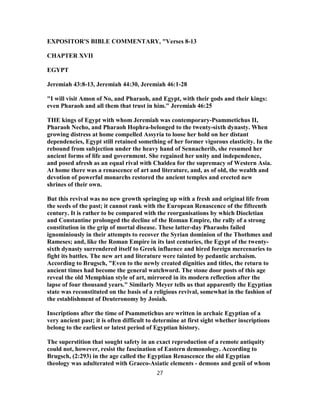
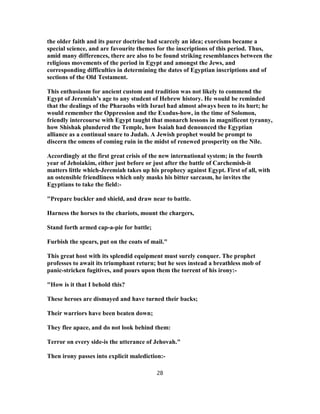
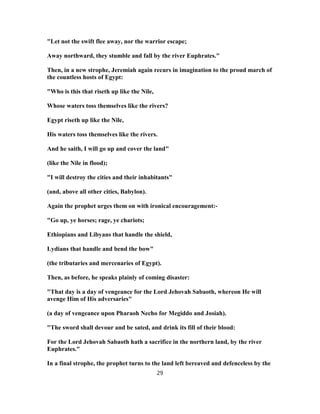
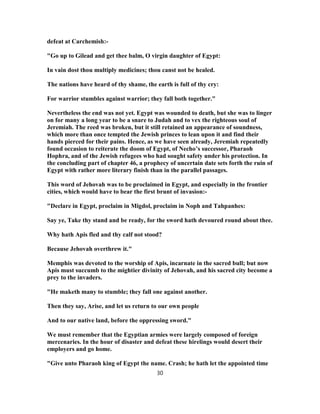
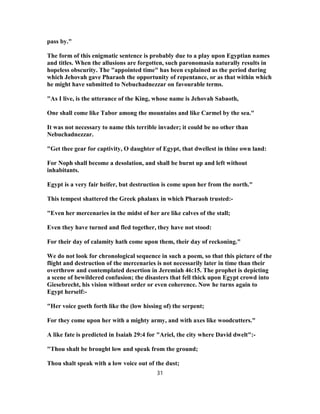
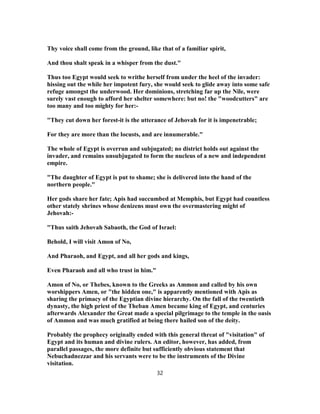
![A further addition is in striking contrast to the sweeping statements of Jeremiah:-
"Afterward it shall be inhabited, as in the days of old."
Similarly, Ezekiel foretold a restoration for Egypt:-
"At the end of forty years, I will gather the Egyptians, and will cause them to
returnto their native land: and they shall be there a base kingdom: it shall be the
basest of the kingdoms." [Ezekiel 29:13-15]
And elsewhere we read yet more gracious promises to Egypt:-
"Israel shall be a third with Egypt and Assyria, a blessing in the midst of the land:
whom Jehovah Sabaoth shall bless, saying, Blessed be Egypt My people, and
Assyria the work of My hands, and Israel Mine inheritance." [Isaiah 19:25]
Probably few would claim to discover in history any literal fulfilment of this last
prophecy. Perhaps it might have been appropriated for the Christian Church in the
days of Clement and Origen. We may take Egypt and Assyria as types of
heathendom, which shall one day receive the blessings of the Lord’s people and of
the work of His hands. Of political revivals and restorations Egypt has had her
share. But less interest attaches to these general prophecies than to more definite
and detailed predictions; and there is much curiosity as to any evidence which
monuments and other profane witnesses may furnish as to a conquest of Egypt and
capture of Pharaoh Hophra by Nebuchadnezzar.
According to Herodotus, Apries (Hophra) was defeated and imprisoned by his
successor Amasis, afterwards delivered up by him to the people of Egypt, who
forthwith strangled their former king. This event would be an exact fulfilment of the
words, "I will give Pharaoh Hophra king of Egypt into the hand of his enemies, and
into the hand of them that seek his life," [Jeremiah 44:30] if it were not evident from
parallel passages [Jeremiah 46:25] that the Book of Jeremiah intends
Nebuchadnezzar to be the enemy into whose hands Pharaoh is to be delivered. But
Herodotus is entirely silent as to the relations of Egypt and Babylon during this
period; for instance, he mentions the victory of Pharaoh Necho at Megiddo-which
he miscalls Magdolium-but not his defeat at Carehemish. Hence his silence as to
Chaldean conquests in Egypt has little weight. Even the historian’s explicit
statement as to the death of Apries might be reconciled with his defeat and capture
by Nebuchadnezzar, if we knew all the facts. At present, however, the inscriptions
do little to fill the gap left by the Greek historian; there are, however, references
which seem to establish two invasions of Egypt by the Chaldean king, one of which
fell in the reign of Pharaoh Hophra. But the spiritual lessons of this and the
following prophecies concerning the nations are not dependent on the spade of the
excavator or the skill of the decipherers of hieroglyphics and cuneiform script;
whatever their relation may be to the details of subsequent historical events, they
33](https://image.slidesharecdn.com/jeremiah43commentary-161128141856/85/Jeremiah-43-commentary-33-320.jpg)
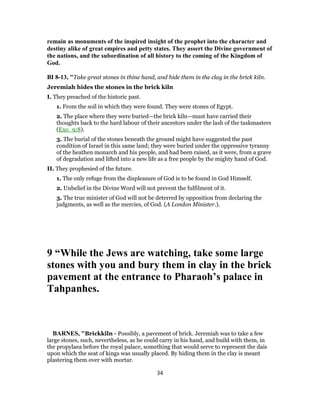
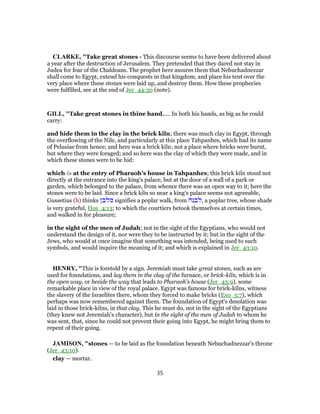
![brick-kiln — Bricks in that hot country are generally dried in the sun, not burned.
The palace of Pharaoh was being built or repaired at this time; hence arose the mortar
and brick-kiln at the entry. Of the same materials as that of which Pharaoh’s house was
built, the substructure of Nebuchadnezzar’s throne should be constructed. By a visible
symbol implying that the throne of the latter shall be raised on the downfall of the
former. Egypt at that time contended with Babylon for the empire of the East.
CALVIN, "He was then commanded to take great stones, and to hide them in the
clay, or cement, in a brick-kiln, that is, in a kiln where bricks were burnt, or in a
place where they were usually made, or where materials were taken to form them.
And this place was not far from the palace of the king in the city of Taphnees, as the
Prophet expressly declares; nay, he says that it was nigh the gate. As, then, this
place was near the palace, the Prophet was bidden to hide there the stones, and in
the sight of the Jews. This was the symbol. Now, it is shewn for what end God would
have the stones to be fixed in the clay or cement; for if the stones were only rolled
there with great labor by the Prophet, there would have been no instruction; and all
signs we know are unmeaning and without any importance without the word. It is
God’s word, then, that in a manner gives life to signs, and applies them for the
benefit and instruction of men. Therefore God’s command is added, that he was to
speak to the Jews: Thou shalt say to them, Thus saith Jehovah. He brings in God as
the speaker, that the threatening might be more effectual, as it has been stated
elsewhere; for if he had only related the words of God, he could not have thus
arrested their attention, which was very tardy. This, then, is the reason why he
speaks in the person of God himself.
COKE, "Jeremiah 43:9. Take great stones—and hide them— Bricks were the chief
materials which the Babylonians used in their most stately buildings; so that there
was constant occasion for such a brick-kiln near Pharaoh's palace. Yet this might be
a great way from the dwelling-house itself, the courts of great kings being almost
equal to cities for extent in antient times; particularly the palace in Babylon was
four miles in compass, according to Diodorus Siculus, lib. 2. See the account of the
emperor of China's gardens, in "Miscellaneous Pieces relating to the Chinese," vol.
2: p. 149.
TRAPP, "Jeremiah 43:9 Take great stones in thine hand, and hide them in the clay
in the brickkiln, which [is] at the entry of Pharaoh’s house in Tahpanhes, in the
sight of the men of Judah;
Ver. 9. Take great stones in thine hand.] Bricks, wherewith Egypt abounded, as
being much of it muddy by reason of the inundation of the river Nile; hence also
their chief city was called Pelusium, or Daphnis Pelusiae. See Jeremiah 43:7. It is
ordinary with Jeremiah to join paradigms with his prophecies, as here, that they
might be the more evident, and take the deeper impression.
PETT, "Jeremiah 43:9
36](https://image.slidesharecdn.com/jeremiah43commentary-161128141856/85/Jeremiah-43-commentary-36-320.jpg)
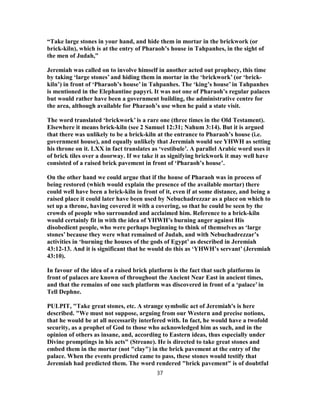
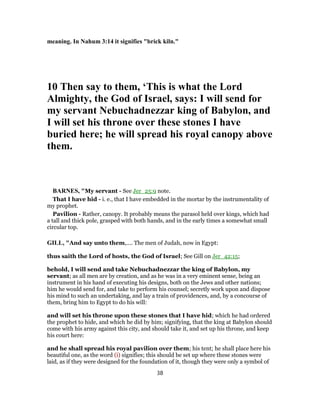
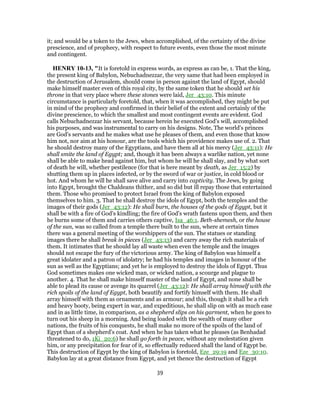
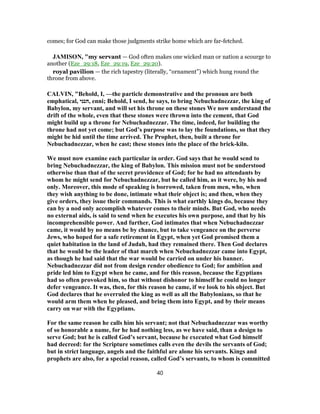
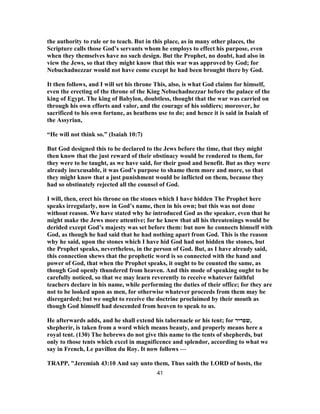
![God of Israel; Behold, I will send and take Nebuchadrezzar the king of Babylon, my
servant, and will set his throne upon these stones that I have hid; and he shall
spread his royal pavilion over them.
Ver. 10. Behold, I will send and take Nebuchadnezzar.] By a secret instinct put into
his heart.
And will set his throne upon these stones.] This was dangerous for Jeremiah to say
at the court gate, and in the hearing of so many disaffected Jews, who would be
ready enough to make the worst of everything. Some say they stoned him with
brickbats (a) for this very prophecy.
PETT, "Jeremiah 43:10
“And say to them, Thus says YHWH of hosts, the God of Israel. Behold, I will send
and take Nebuchadrezzar the king of Babylon, my servant, and will set his throne
upon these stones that I have hidden, and he will spread his royal covering over
them.”
The purpose behind the setting of the large stones hidden in the brickwork or brick-
kiln was that they were to be a reminder that in the future Nebuchadrezzar,as
YHWH’s servant, would set a throne over them, and spread over them his royal
‘canopy’ or ‘covering’ (the word occurs only here). This may have been a canopy
over his head, or a covering on which his throne was then placed, or even a pavilion.
Thus ironically the people who had fled from Nebuchadrezzar, ‘YHWH’s servant’,
in disobedience to YHWH, would find YHWH’s servant sitting over them as their
ruler and lord in their very place of refuge.
Note the full blown title, ‘YHWH of Hosts, the God of Israel’, a reminder that
YHWH was the God of battle Who was over all the hosts of the world, as well as
being the God of Israel. Even Nebuchadrezzar with all his might was His servant to
do His will.
PULPIT, "And will set his throne, etc.; viz. for the victorious king to hold judgment
(comp. Jeremiah 1:15, Jeremiah 1:16; Jeremiah 49:38). He shall spread his royal
pavilion; rather, his tapestry (the root means "brilliance"); i.e. the bright coloured
covering of the throne.
11 He will come and attack Egypt, bringing death
to those destined for death, captivity to those
42](https://image.slidesharecdn.com/jeremiah43commentary-161128141856/85/Jeremiah-43-commentary-42-320.jpg)
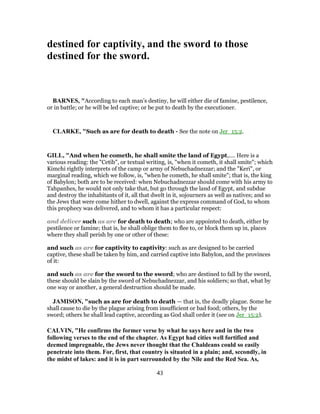
![then, Egypt was on every side so well fortified, they thought that there would be
there a quiet nest for them. But God declares that King Nebuchadnezzar would
become the conqueror of the whole land; and he removes all objections when he
says, —
Those for death, to death; those for captivity, to captivity; those for the sword, to the
sword; as though he had said, “Were Egypt ever so populous, yet the immense
multitude of men will avail nothing, for they shall be conquered by their enemy; for
some shall perish by the sword, and some by various kinds of death, and some shall
be driven into exile; and Egypt shall be destroyed, as though no one stood up in its
defense.” We hence see that this was added, that the Prophet might shake off the
false confidence of the Jews. To the same purpose are the two following verses.
TRAPP, "Jeremiah 43:11 And when he cometh, he shall smite the land of Egypt,
[and deliver] such [as are] for death to death; and such [as are] for captivity to
captivity; and such [as are] for the sword to the sword.
Ver. 11. And when he cometh.] Being sent and set on by God.
He shall smite the land of Egypt.] As for their idolatry, &c., so especially for
harbouring these perfidious Jews, whom divine vengeance still pursues hot foot, and
will not allow them to live anywhere, since they would not be persuaded to live in
God’s good land, and by his good laws.
PETT, "Jeremiah 43:11
“And he will come, and will smite the land of Egypt; such as are for death will be
given to death, and such as are for captivity to captivity, and such as are for the
sword to the sword.”
In typical Jeremaic language (compare Jeremiah 15:2) it is declared that
Nebuchadrezzar will come and smite the land of Egypt bringing death, captivity and
sword on its inhabitants, including the hapless Judeans. Rather than escaping
death, captivity and sword by their flight the fugitives had plunged themselves right
into them. They would each receive their inevitable end, along with those who had
welcomed them. As we have seen above a damaged Babylonian tablet confirms this
invasion of Egypt by Nebuchadrezzar, whilst not giving the details because of its
damaged state.
PULPIT, "He shall smite the land of Egypt. On the invasion of Egypt by
Nebuchadnezzar, wrongly controverted by some, see note on Jeremiah 46:13. Such
as are for death. Such as are destined for death (i.e. pestilence, as Jeremiah 15:2;
Jeremiah 18:21). The words, "and deliver," prefixed in the Authorized Version, are
unnecessary; "land" is equivalent to "population."
44](https://image.slidesharecdn.com/jeremiah43commentary-161128141856/85/Jeremiah-43-commentary-44-320.jpg)
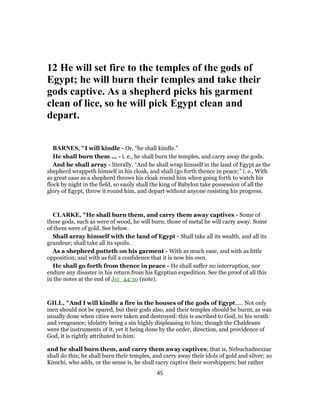
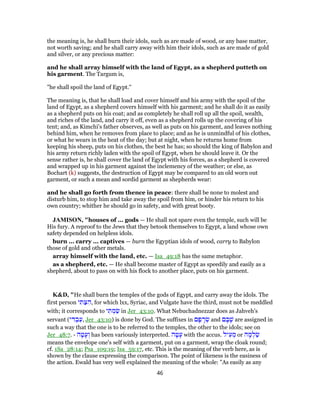
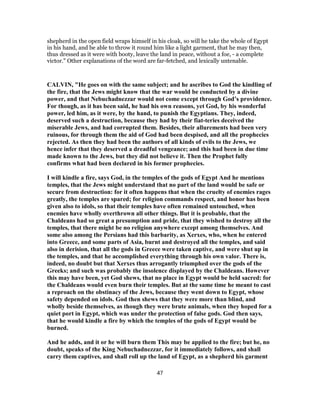
![The verb properly means to cover, but it means also sometimes to gather up. It may
be rendered here to roll up, as we say in French, trousser et entortiller. He
intimates, that Nebuchadnezzar would, according to his own will, so rule in Egypt,
that he would heap together all the wealth of the whole land: and as a shepherd,
when he leads his flock to another place, collects his utensils, and rolls up his
garments, or folds himself in them; so Nebuchadnezzar, says the Prophet, would
gather together, or roll up the whole land of Egypt He mentions land, as signifying
the wealth which Nebuchadnezzar accumulated. At length he adds, and thence shall
he depart in peace He shews that the conquest would be complete, for the Egyptians
would not dare to mutter, nor dare to follow their enemy on his departure; for he
would be as though he were in a peaceable place, and in his own kingdom. (131)
COFFMAN, "PROPHECY AGAINST THE GODS OF EGYPT
"And I will kindle a fire in the houses of the gods of Egypt; and he shall burn them,
and carry them away captive: and shall array himself with the land of Egypt, as a
shepherd putteth on his garment; and shall go forth from thence in peace. He shall
also break the pillars of Bethshemesh, that is in the land of Egypt; and the houses of
the gods of Egypt shall he burn with fire."
"As a shepherd putteth on his garment ..." (Jeremiah 43:12). Keil gave special
attention to the words thus rendered and gave as his opinion that they are properly
translated thus: "As easily as any shepherd in the open field wraps himself in his
cloak," adding that, "Other explanations of the word are far-fetched and lexically
untenable."[12]
We would like to call attention to the preposterous mistranslation of this passage in
the Good News Bible. "As a shepherd picks his clothes clean of lice, so the king of
Babylon will pick the land of Egypt clean." Such words are simply not in the text.
James Moffatt's Translation of the Bible (1929) didn't do any better: "He shall
scour the land of Egypt as a shepherd picks vermin out of his plaid."
"Bethshemesh ..." (Jeremiah 43:13). The Revised Standard Version renders this
place Heliopolis on the probability that they might be the same. If that identity is
correct, the Egyptian temple of the Sun God was located there.
COKE, "Jeremiah 43:12. I will kindle a fire— He shall kindle a fire. Houbigant.
"Nebuchadrezzar shall burn by my orders the temples of Egypt, and the palaces of
the great men; and shall lead into captivity the kings, the subjects, and the gods."
The author of the Observations remarks, that, "as the Arabs frequently withdraw
themselves out of the reach of very potent enemies, by retiring into the depths of the
wilderness; so, if provoked, they can occasion them very great bitternesses, it not
being possible to be always guarded against them. It is but a little while ago that the
public papers gave an account of their destroying many thousands of the Mecca
pilgrims, upon some disgust which the Turkish government had given them, and
filling the whole country with lamentation. Nor do the victories of the most
48](https://image.slidesharecdn.com/jeremiah43commentary-161128141856/85/Jeremiah-43-commentary-48-320.jpg)
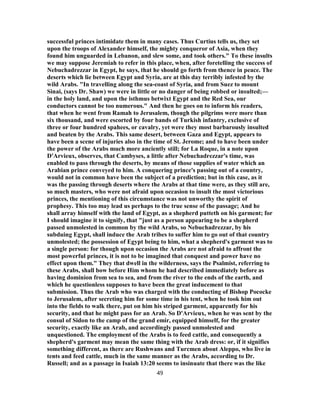
![distinction in his times;—Neither shall the Arabian pitch tent there, neither shall the
shepherds make their fold there;-that different dress of a shepherd, whatever it was,
must equally protect a person in those deserts, for there would be no such thing as
feeding of cattle in them, if such sort of persons were molested by the Arabs, as
passengers are. See Observations, p. 61.
TRAPP, "Jeremiah 43:12 And I will kindle a fire in the houses of the gods of Egypt;
and he shall burn them, and carry them away captives: and he shall array himself
with the land of Egypt, as a shepherd putteth on his garment; and he shall go forth
from thence in peace.
Ver. 12. And I will kindle a fire in the houses of the gods of Egypt.] Goodly gods
they were, that could not keep their temples from burning! Diana, said one jestingly,
was so busy at the birth of great Alexander that she could not for some while be at
Ephesus, where her stately temple was at the same time set on fire by Herostratus.
And he shall array himself with the land of Egypt, as a shepherd putteth on his
garment,] i.e., Easily and speedily shall he carry away the spoil of that rich country,
there being none there to hinder him, either in taking them or carrying them away:
“ Pastor enim secure portat tectumque, laremque. ”
PETT, "Jeremiah 43:12
“And I will kindle a fire in the houses of the gods of Egypt, and he will burn them,
and carry them away captive, and he will array himself with the land of Egypt, as a
shepherd puts on his robe, and he shall go forth from thence in peace.”
Note the change of person to ‘I’. YHWH Himself was involved in this. Not only the
people but also the gods in whom they trusted would be humiliated, for YHWH
Himself would kindle a fire in the houses of the gods of Egypt (YHWH’s brick
kiln?). So in the face of YHWH’s anger the gods of Egypt were no safer than the
people. The Egyptian gods and their houses would be burned with fire, whilst the
gods themselves would also be carried off as trophies into captivity. Thus the very
gods whom they had trusted to keep them from captivity would themselves be taken
captive. Josephus later confirms that at this time the Jewish captives were carried
off to Babylon.
Furthermore Nebuchadrezzar, as YHWH’s servant, would ‘array himself with the
land of Egypt as a shepherd puts on his robe’. Egypt was no match for the one
chosen by YHWH to carry out His purposes. It was simply rather an accessory, a
cloak for YHWH’s shepherd, to be tossed casually around his shoulders.
Whilst the invasion by Nebuchadrezzar was rather a punitive expedition in the face
of different Egyptian activities against their possessions, than a full-scale invasion, it
was totally successful and resulted in a peace treaty between himself and Ahmose II,
50](https://image.slidesharecdn.com/jeremiah43commentary-161128141856/85/Jeremiah-43-commentary-50-320.jpg)
![which no doubt acknowledged Babylonian rights in Syria, Cyprus and Palestine,
after which Nebuchadrezzar retired in peace, his aims accomplished.
PULPIT, "Burn them; viz. the temples. Egypt was full of gorgeous and imposing
temples, which could not, however, always be burned, nor were the conquerors of
Egypt anxious to display hostility to Egyptian religion. Carry them away captives;
viz. the idol gods (comp. Jeremiah 48:7, "Chemosh shall no forth into captivity:"
and Isaiah 46:2, "Their soul [or, 'personality'] hath gone into captivity"). The
prophet speaks from the point of view of a believer in the idol gods. He shall array
himself with the land of Egypt, etc. (For "array himself with" and "putteth
on,"read wrap himself in and wrappeth himself in.) Ewald well explains this figure.
"As easily as the shepherd in the open field wraps himself in the cool night in his
mantle, will he be able to grasp Egypt with his hand and fling it round him like an
easily managed garment, in order then to leave the land as an absolute conqueror,
clothed in this attire of booty, in peace, without an enemy."
13 There in the temple of the sun[b] in Egypt he
will demolish the sacred pillars and will burn
down the temples of the gods of Egypt.’”
BARNES, "Images - Rather, pillars (compare the Isa_19:19 note), obelisks.
Beth-shemesh - Heliopolis, famous for its obelisks.
CLARKE, "He shall break also the images of Beth-shemesh - שמש בית beith
shemesh is, literally, the house or temple of the sun; which was worshipped here, and
whose images are said to have been of solid gold. These Nebuchadnezzar was to break
and carry away; and the houses of the gods - all the temples of Egypt, he was to burn
with fire. Beth-shemesh is the same as Heliopolis.
GILL, "He shall break also the images of Bethshemesh, that is in the land of
Egypt,.... Or, "of Heliopolis", as the Septuagint; the "city of the sun"; and so
"Bethshemesh" here signifies the "house of the sun"; either it designs the temple of the
sun, or the city where it was worshipped; as Heliopolis was famous for the worship of
51](https://image.slidesharecdn.com/jeremiah43commentary-161128141856/85/Jeremiah-43-commentary-51-320.jpg)
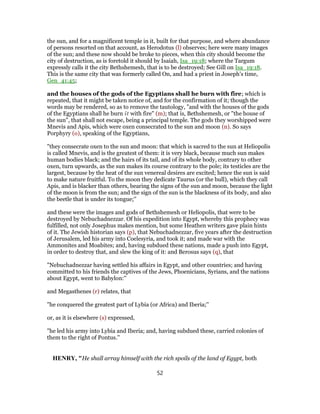
![beautify and fortify himself with them. He shall array himself with them as ornaments
and as armour; and this, though it shall be a rich and heavy booty, being expert in war,
and expeditious, he shall slip on with as much ease and in as little time, in comparison,
as a shepherd slips on his garment, when he goes to turn out his sheep in a morning.
And being loaded with the wealth of many other nations, the fruits of his conquests, he
shall make no more of the spoils of the land of Egypt than of a shepherd's coat. And
when he has taken what he pleases (as Benhadad threatened to do, 1Ki_20:6) he shall go
forth in peace, without any molestation given him, or any precipitation for fear of it, so
effectually reduced shall the land of Egypt be. This destruction of Egypt by the king of
Babylon is foretold, Eze_29:19 and Eze_30:10. Babylon lay at a great distance from
Egypt, and yet thence the destruction of Egypt comes; for God can make those
judgments strike home which are far-fetched.
JAMISON, "images — statues or obelisks.
Beth-shemesh — that is, “the house of the sun,” in Hebrew; called by the Greeks
“Heliopolis”; by the Egyptians, “On” (Gen_41:45); east of the Nile, and a few miles north
of Memphis. Ephraim Syrus says, the statue rose to the height of sixty cubits; the base
was ten cubits. Above there was a miter of a thousand pounds weight. Hieroglyphics are
traced around the only obelisk remaining in the present day, sixty or seventy feet high.
On the fifth year after the overthrow of Jerusalem, Nebuchadnezzar, leaving the siege of
Tyre, undertook his expedition to Egypt [Josephus, Antiquities, 10.9, 7]. The Egyptians,
according to the Arabs, have a tradition that their land was devastated by
Nebuchadnezzar in consequence of their king having received the Jews under his
protection, and that it lay desolate forty years. But see on Eze_29:2; Eze_29:13.
shall he burn — Here the act is attributed to Nebuchadnezzar, the instrument,
which in Jer_43:12 is attributed to God. If even the temples be not spared, much less
private houses.
K&D, "In conclusion, mention is further made of the destruction of the famous
temple of the Sun at Heliopolis, to show the fulfilment of the prophecy that all Egypt
would fall under the power of Nebuchadnezzar. ית ֵבּ שׁ ֶמ ֶ,שׁ "House of the Sun," is the
Hebrew rendering of the Egyptian Pe-râ, i.e., House of the Sun, the sacred name of the
city vulgarly called On; see on Gen_41:45. It lay north-east from Cairo, near the modern
village of Matarieh, and thus pretty far inland; it was renowned for its magnificent
temple, dedicated to Râ, the Sun-god. At the entrance to this building stood several
larger and smaller obelisks, of which the two larger, added to the two older ones by
Pheron the son of Sesostris, were about 150 feet high. One of these the Emperor
Augustus caused to be brought to Rome; the other was thrown down in the year 1160;
while one of the more ancient but smaller obelisks still stands in its original position,
raising its head in the midst of a beautiful garden over a mass of dense foliage. These
obelisks are signified by ת בֵצּ ַ.מ The additional clause, "which is in the land of Egypt,"
does not belong to Beth-shemesh, as if it were appended for the purpose of
distinguishing the city so named from Beth-shemesh in the land of Judah; the words are
rather connected with ת בֵצּ ַ,מ and correspond with י ֵה ֱא םִי ַר ְצ ִמ in the parallel member
53](https://image.slidesharecdn.com/jeremiah43commentary-161128141856/85/Jeremiah-43-commentary-53-320.jpg)
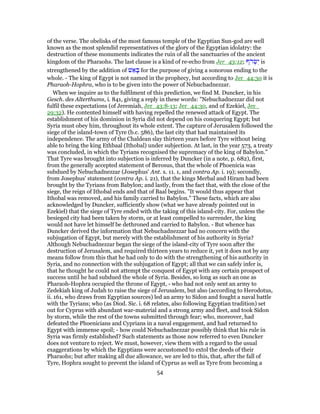
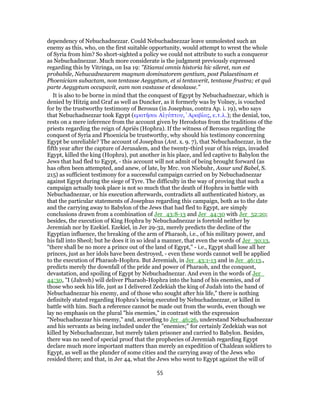
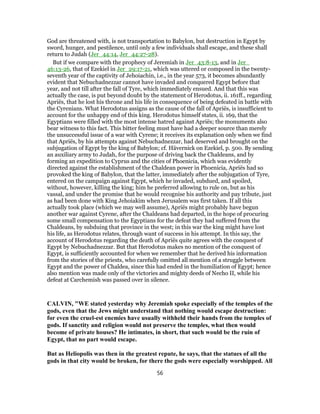
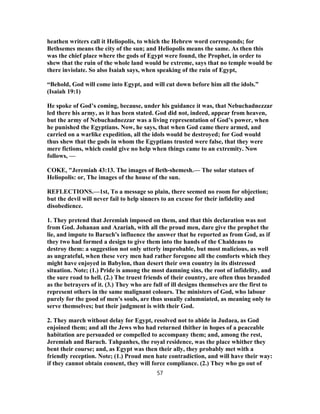
![God's way have only themselves to blame for the consequences.
2nd, Though Jeremiah was now against his will in this strange land, God comforts
him with the visits of his grace, and employs him to denounce his wrath: since they
have rejected him as their teacher, he must be their troubler. They sought refuge in
Egypt, hoping to be there protected from the Chaldeans; but thither shall the
Chaldeans pursue them, and destroy both them and the Egyptians who have
received them.
1. By a sign the destruction of Egypt is set forth. God commands Jeremiah to take
great stones, and hide them in the brick-kiln, which was not far from Pharaoh's
house, in the sight of the men of Judah, who would observe the sign, and be
inquisitive about the meaning.
2. This is at large declared. The king of Babylon, employed as God's servant, who
had destroyed Jerusalem, shall prosecute his victories, and Egypt fall before him: on
these very stones should his throne be set, and his pavilion spread over it. By
famine, pestilence, and the sword, those doomed to death must fall, and others be
led into a miserable captivity; and, so far from being ableto defend their votaries,
the numerous gods of Egypt shall not be able to defend themselves; their temples
with the idols burnt, or the precious materials carried away among the spoils. As
easily as a shepherd puts on his coat, and so adorned, shall Nebuchadrezzar and his
army return laden with the wealth of Egypt, and leave the country in peace, intirely
subjected to his government. Note; (1.) It is dangerous to admit those into our
friendship, whom God pursues as an enemy, lest we share in their plagues. (2.) God
often makes one wicked nation a scourge to another; and, while the conquerors
mean nothing less, they are but the instruments that his providence employs.
TRAPP, "Jeremiah 43:13 He shall break also the images of Bethshemesh, that [is] in
the land of Egypt; and the houses of the gods of the Egyptians shall he burn with
fire.
Ver. 13. He shall break also the images of Bethshemesh.] Or, Heliopolis, where the
sun was worshipped with great superstition, as Herodotus (a) writeth. The Hebrews
also called this city On, or Aven - that is, vanity or iniquity - as well they might, for
the abominable idolatry there committed. Josephus (b) saith, that five years after
this prophecy, Nebuchadnezzar, who had Egypt given him as pay for his pains at
Tyre, invaded Egypt; and the king thereof being slain, he set up another there, and
took the Jews that remained alive away into Babylon.
PETT, "Jeremiah 43:13
“He will also break the pillars of Beth-shemesh, which is in the land of Egypt; and
the houses of the gods of Egypt he will burn with fire.”
The outstanding feature of Nebuchadrezzar’s activities as YHWH’s servant would
58](https://image.slidesharecdn.com/jeremiah43commentary-161128141856/85/Jeremiah-43-commentary-58-320.jpg)
